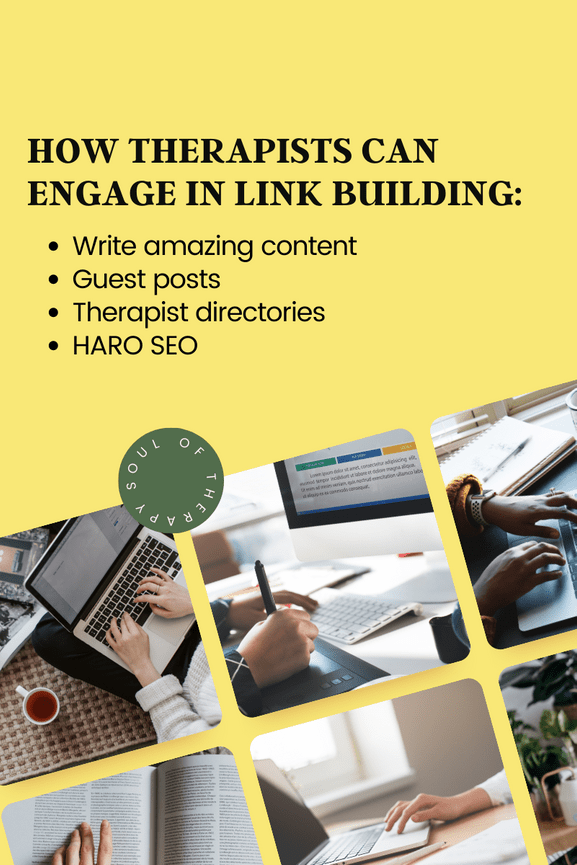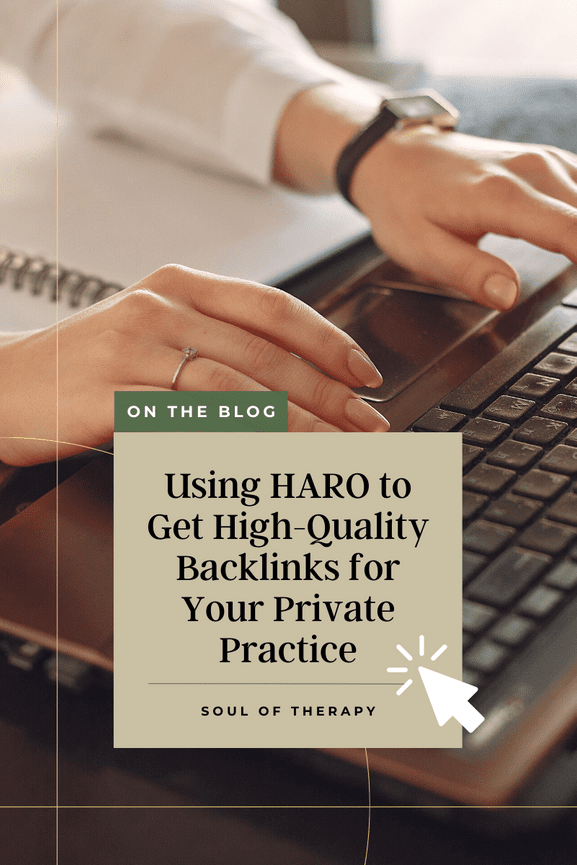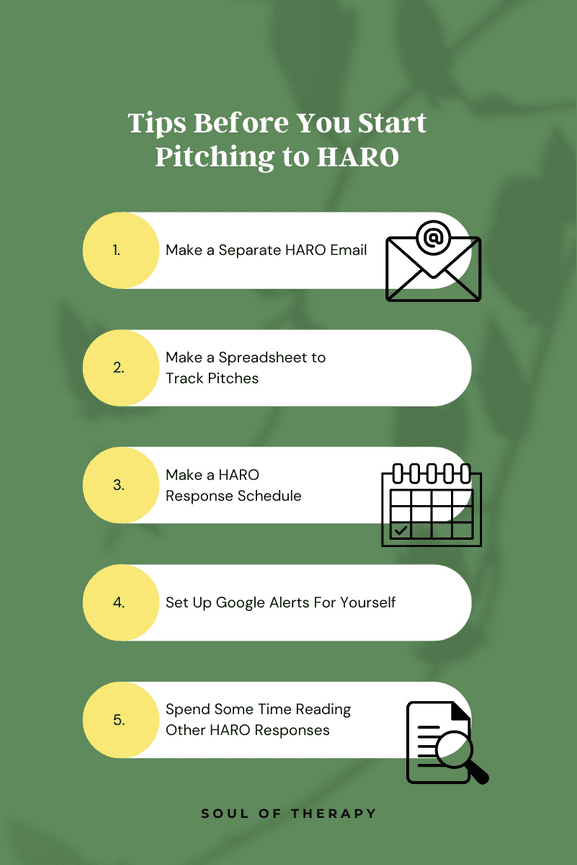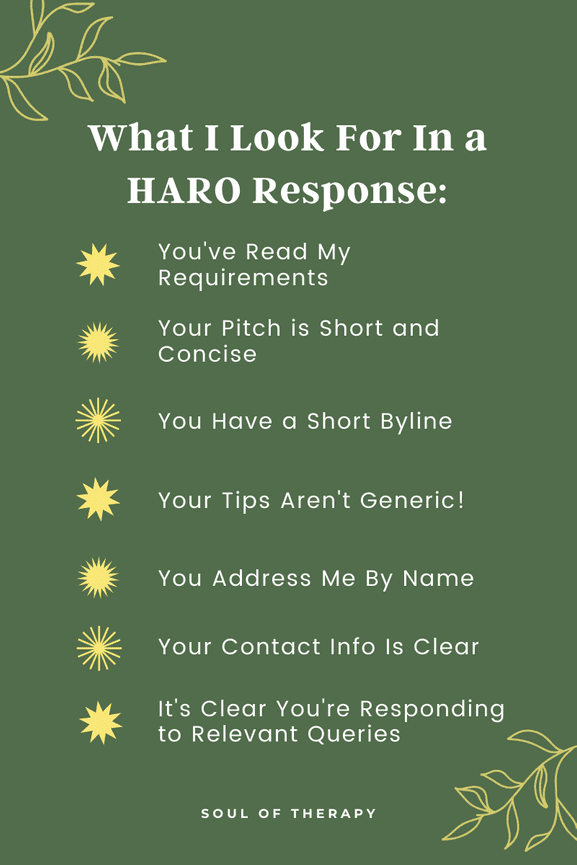HARO (Help a Reporter Out) is one of my favorite link-building strategies for therapists. I've used it myself to get more links for my website, and I've also consulted with many of my writing clients to help them boost their website SEO.
HARO is a free service, and it's fairly easy and intuitive. Best of all? It can dynamically and authentically improve your website's SEO- all while getting you some exciting publicity.
Here's my complete in-depth guide to using HARO to build links for your site!
Why Are Backlinks Important?
To understand the benefit of HARO queries, you should first understand the benefit of link-building. In a nutshell, link-building refers to acquiring links from other websites to your own. These types of links are known as backlinks.
Backlinks are part of an effective off-page SEO strategy. Every time a high-quality website links back to your page, you get a little more SEO credibility.
Still a little confused?
Here's a helpful analogy: Imagine that Google is one massive public high school. The big sites like Forbes, Huffington Post, and Yahoo are the popular guys. Everyone knows and (mostly) trusts them, and they run the show (whether you like it or not). And if one of those guys waves to your website, it makes you look more credible and established. The more that you have 'popular sites' wave to you, the better. This basically tells Google that you're a trusted source, and Google rewards your website by boosting your online visibility.
How Can Therapists Engage in Link-Building?

Acquiring high-authority backlinks is probably one of the most challenging parts of SEO. It's especially difficult for therapists because SEO performance typically isn't a top marketing strategy for private practice.
And here's the thing: everyone wants high-quality links, but the best link-building strategies can be time-consuming, and the results aren't guaranteed.
Write amazing content: The better your website content is, the more likely you are to have someone link it. For example, if you write a super comprehensive guide about EMDR and nail every nuanced detail about it, there's a chance another blogger/website will source your website when they write an article about EMDR.
Guest posts: You can write guest posts for other bloggers/websites in exchange for a backlink. Some opportunities are paid (like the ones we have here), some are free, and some require you to pay (this is often known as a sponsored guest post).
Paid link-building services: Numerous SEO agencies offer link-building packages. I don't recommend hiring one of these companies. Their strategies generally fall under 'black hat SEO,' and these tactics violate Google's Webmaster Guidelines and can lead to penalties. Likewise, 99% of the time, the links will be on spammy sites, and you have no guarantee that they won't just be taken down a few weeks or months after publication.
Therapist directories: Some therapist directories offer a backlink. Keep in mind this varies from site to site (for example, despite the misconception, Psychology Today does not offer a legitimate backlink!).
HARO SEO: HARO SEO backlinking allows you to get on important "popular guy" websites without all the legwork traditional link-building takes.
What Is HARO?

HARO is a FREE media coverage service that acts as a liaison between journalists and relevant sources. A journalist or writer uses HARO pitches when they need expertise on a specific issue. HARO isn't just for therapists- it's a service that's used for nearly every topic you can imagine!
For example, let's say a journalist for Forbes needs to write a comprehensive article about treatment approaches for depression. But, they aren't a qualified mental health professional- they're a journalist!
And so, instead of diving into extensive research (which is time-consuming), they might use HARO. This service allows them to pitch their query to qualified therapists to provide their insights on the best treatment approaches for depression.
They will then quote those therapists in their article. If you've ever read an online article that integrates quotes like, According to ___, licensed marriage and family therapist, there's a good chance you read an article that integrated HARO services.
How Does HARO Link Building Work?
Did I mention that HARO is free? In a world where everything comes at a premium, HARO offers a free plan for media sources. Pitching journalists use HARO to connect with numerous experts fast and effectively. It's a win-win situation for everyone.
First, you will need to sign up for your HARO account here.
Then, you will need to provide your account details and set up your HARO preferences. I recommend signing up for the Master HARO preference. That one will send you all the journalist requests.
After signing up, HARO sends three emails per day (5:35 a.m., 12:35 p.m., and 5:35 pm ET) on Monday through Friday.
You can then scan through these emails to determine if you have the expertise for any of these queries. If you have the right expertise, you can then email the journalist directly with your pitch. That's it!
Tips Before You Start Pitching to HARO

If HARO sounds simple, it's because it is. Many therapists have found great success using this approach, and when done well, it can provide incredible value for your practice website.
There's just one catch: Everyone is using HARO these days. It's no longer this hush-hush link-building strategy. If you look up anything about how to build links, HARO comes right up. So that means, it's become inherently more competitive, and you really need to stand out from all the other users responding to pitches.
Before you respond to a HARO query, it's a good idea to have a solid strategy in mind. It's easy to feel overwhelmed by the process and waste time and energy- only to get nothing published.
Here are some actionable tips that can help you stay on track.
Make a Separate HARO Email
Make a separate email account to send and receive messages. This makes things logistically easier, and you won't have to worry about missing an important email.
Make a Spreadsheet to Track Pitches
I like to make spreadsheets to track the pitches I send journalists. My spreadsheet includes the date, topic, media outlet, and pitch. I also track if a pitch is approved and when the article is published.
Make a HARO Response Schedule
If you've decided to invest in using HARO for your website, it's important to consider establishing some kind of routine for yourself. As mentioned, HARO sends out emails three times a day. I recommend setting aside a certain number of hours per week to focus solely on responding to these emails (ideally, those times are close to 5:35 a.m., 12:35 p.m., and 5:35 pm ET.
It's unrealistic to respond to every HARO request that comes your way (unless you really have a lot of time to devote to your SEO right now). Instead, making a schedule holds you accountable. It also avoids you from getting overwhelmed or resentful of the process.
Set Up Google Alerts For Yourself
In my experience, journalists rarely get back to you if a pitch is approved. You can set up a Google alert for yourself to detect any websites that use your name.
Spend Some Time Reading Other HARO Responses
Certain publications use HARO all the time. You'll see the same media sources used time and time again (Bustle, Fatherly, Women's Health, Yahoo, Best Life Online- these are all some well-known sources that publish lots of articles using HARO).
It isn't a bad idea to check out some of their articles. You'll get a feel for the company's tone and the type of responses they probably gravitate toward.
Top Tips for Sending the Perfect HARO Pitch
Okay! You're ready to get started. You've signed up for HARO emails, and you're ready to take advantage of these awesome media opportunities. Let's not waste any more time.
Respond Quickly
Journalists (and most businesses) often have tight deadlines. Regardless of the journalist's requested deadline, aim to reply as fast as possible. You want to be one of the first responses a journalist gets. If it's really good, they'll set it aside.
Remember that journalists receive a high volume of responses. Sometimes, they need just one response. Other times, they want to quote several experts.
Make sure that you haven't missed the deadline- even if you have an amazing pitch, HARO will automatically discard responses once the deadline passes.
Only Answer Relevant Queries
Most journalists will provide specific requests about what they want from a media source. For example, they might indicate that they want responses ONLY from licensed therapists or psychologists. Other times, the qualifications are more generic and might say something like, "seeking insights from any relationship expert."
Do not answer queries where you don't have qualified expertise. This is a waste of your time, and it's a waste of the journalist's time as well.
Use the Title in the Subject Lines
Do not leave the subject line blank! Ever!
And keep in mind that journalists may be writing several articles at the same time (and they might be using HARO for each of them).
So, to keep things organized for everyone, use a subject line that says something like, Licensed therapist insight on best treatment methods for depression
Make Pitches Concise
I can't emphasize this enough. If you want to craft quality pitches, get to the point immediately. Nobody wants to read a lengthy backstory.
Focus on making a 1-2 sentence intro and a 3-4 sentence pitch (unless the journalist specifically asks for something different).
Do Not Add Email Attachments
This is actually against the HARO rules, so don't do it.
Do NOT Ask Them to Reach Out to You
You'd be surprised how many people write emails like, I am a qualified expert on this topic. Please get back to me if you'd like to discuss.
That's exactly what not to do! You want your pitch to contain everything the journalist needs. Your HARO response should be concise and provide exactly what the query requests.
Don't Forget Your Website Link
The backlink is the point, right? I recommend using your private practice website (the general website- not a specific blog post or About Me page).
It's perfectly reasonable to ask for a backlink directly. I use a standard line like, If you use my insights for your article, you can cite me with my website link as Nicole Arzt, LMFT at souloftherapy.com
Respond to Any Follow-Up Questions
Journalists may reach out to you to clarify or expand a certain point. This almost always means they want to use your pitch. Make sure you respond back to their query quickly. I can't emphasize the benefits of fast responses highly enough!
Share Published Articles
As a courtesy to journalists or bloggers, it's considered great etiquette to share articles on social media with your published backlink.
Doing so benefits everyone. You're showing off your media coverage, which inherently helps you look more credible. In addition, the article will likely get more traffic. And best of all? That journalist might be more inclined to use your quote again. They may even reach out to you directly next time. This has happened to me, and it makes the process even more streamlined.
What I Look For In a HARO Response

Having used HARO as a journalist myself for various articles, I know what it's like to comb through lots of pitches. Here's what helps me decide when to use one trusted source over another.
You've Read My Requirements
Read the journalist's requirements!
If I want 3-5 tips on how to actively listen to your child, don't provide 12 tips. If I'm looking for a licensed therapist, don't respond if you're an associate. You may get lucky, but there's a good chance you're just wasting time if you don't follow the stated requirements.
I might overlook if a killer response doesn't check all the boxes, but I strongly appreciate it when a query answers everything I ask.
Your Pitch is Short and Concise
I recommend keeping your responses brief and efficient. Do not provide excessive detail (unless specifically asked). Use bullet points appropriately.
You Have a Short Byline
Choose 1-2 sets of letters behind your name. Most journalists won't publish more than that, and if you provide too many, you risk them picking and choosing what they think is appropriate (which may not represent you the way you want).
Your Tips Aren't Generic!
As much as possible, provide unique insights into the topic. Many times, journalists want actionable tips that bring something new to the reader. If I can Google my question and get your response within the first page of the results, it probably isn't going to stand out.
You Address Me By Name
In almost all cases, the journalist will provide their name in the query. Addressing someone by name makes it feel a little more personal, and it's something I always notice.
Your Contact Info Is Clear
Reiterate your name, credentials, and email at the end of your pitch. You will only get one website backlink, so don't provide several websites.
It's Clear You're Responding to Relevant Queries
If I ask you for specific advice about working with college students and your practice website only advertises that you work with older students, I'm probably going to hesitate before considering your pitch. Not every journalist will do backend research, but I like knowing who my sources are- after all, my name is going to be on that article!
Final Thoughts on HARO Link-Building Service
HARO link-building is an amazing SEO strategy for your private practice.
It's free and has an extremely low barrier to entry for securing some of the best links! It also doesn't require nearly as much effort as making consistent blog posts or other SEO methods. Plus, it's exciting to see your name written in popular media outlets.
Here's to writing your perfect pitch!


0 Comments